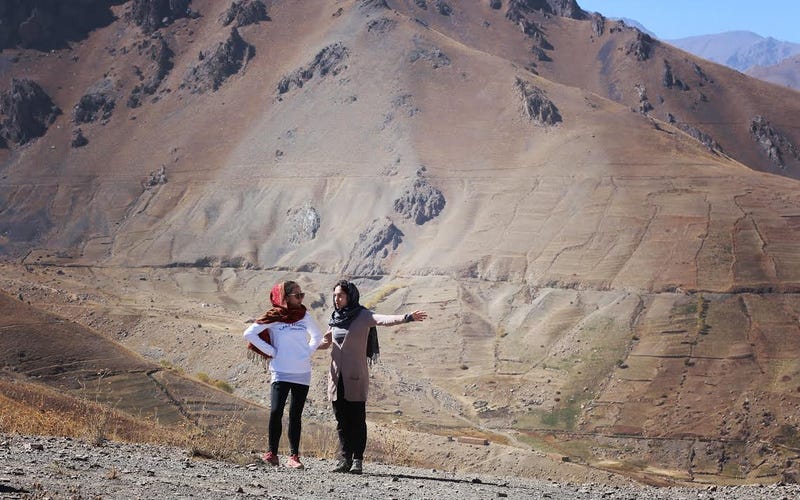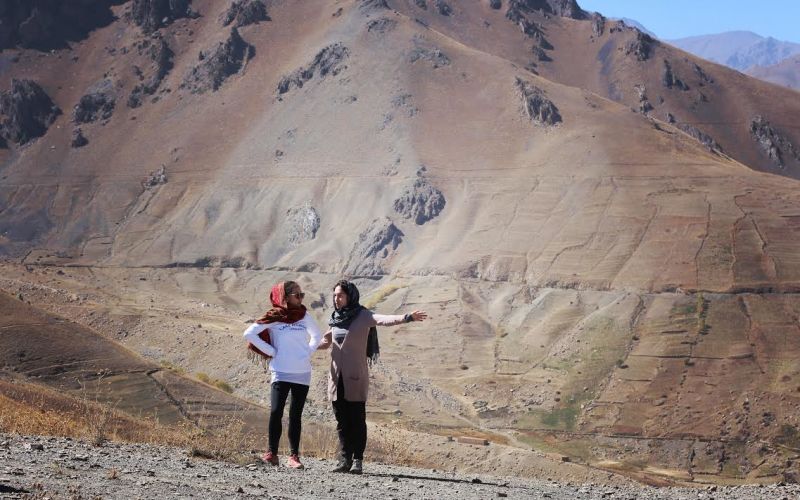
“Women can’t walk outside at all, to say nothing of running,” Jessica Wright told me. They’re not supposed to be seen. Particularly as a foreigner, you literally can’t walk anywhere, not even covered. So I did all my training for the marathon on a treadmill in a tiny room in my boss’s house.”
Advertisement
A 32-year-old lawyer, Wright ran her first marathon in New York City last weekend, but it was not just a 26.2 mile challenge for her. She was one of five runners in the NYC Marathon raising money for Free To Run, a nonprofit that gives girls and women living in conflict zones opportunities to participate in sports.
Wright took a job with a commercial law firm in Kabul, Afghanistan, in 2015. Having lived there for a year now, she’s seen firsthand what it’s like to be a woman in one of the worst places in the world to be female. Though her public life is as limited as any Afghan woman’s, it’s her world of possibilities—to live and work in Afghanistan, to run a marathon—that separates her from her Afghan friends and colleagues. Right now, many Afghan women can’t even imagine participating in sports.
Advertisement
“I don’t know if depressing is the right word,” Wright said when we met the day before the NYC Marathon. “It’s going to require a change in the way women think, which is hard and takes time. But their curiosity seems to betray a desire to be able to participate in sports or be active. I don’t know if I’m a role model [as a foreigner], but I hope my goals and accomplishments inspire Afghan women to live they way they want. I mean, running is a big part of my life; I want other people to be able to do that.”
In fact, being able to run, in some fashion, was one of the conditions of accepting the job. Wright told me when she thought about taking the job in Kabul, she was really worried about being “sedentary and sort of trapped inside.”
As she wrote in a journal entry:
Sponsored
I made acceptance of the offer almost conditional on the procurement of a treadmill. I asked about armored cars, tracking devices, personal protective gear, and concealed carry permits, but mostly I was concerned about whether I would be able to reconcile life in a conflict zone with my running habit. The informal treadmill clause was how I dealt with all the doubts and anxieties I had about moving to Afghanistan. There could be suicide bombings and kidnappings, a resurgent Taliban and a NATO troop drawdown, unfamiliar food, unreliable Internet, and the storied drama of expat life, but if I could run, I was certain everything would be fine.
Wright lives in a gated house with a walled backyard, along with five other expats. A driver takes her anywhere she goes, like other foreigners. While Afghan women’s public forays are restricted by societal rules, foreigners’ avoidance of public places is more out of fears of attack or kidnapping.
Advertisement
Advertisement
“I don’t even know what to say about security,” she said. “I wear a headscarf, leggings, a long tunic and, in winter, a long coat over that. I have a niqab, but I don’t wear it because I can’t see where I’m going. Even covered up, though, Afghanis can tell you’re a Westerner, by your shoes, by the way you walk.
“I take all the precautions—I try not to be seen very much, go to work at different times of day and take different routes to work. You get used to being cautious, but it’s easy to become complacent. Things do happen.” The day we spoke, an Australian woman was kidnapped at gunpoint in Kabul.
There are no women’s gyms that she knows of in the city, and no sports programs for girls.
Advertisement
Wright learned about Free To Run from other expats. The brutal murder of Farkhunda—an Afghan woman who was beaten, stoned, run over with a car, and burned by a mob who believed, incorrectly, that she’d burned a Quran—further inspired her to do something for women’s rights. Free To Run had five spots in the NYC Marathon; Wright applied and received one of those spots, pledging to raise $3,200 for equipment and opportunities for high school and college age girls to hike, run, and ski.
That entry also meant she had to train for a marathon—she’d never run more than a half-marathon—while working full time, without going outside.
“We bought a used treadmill and squeezed it into this tiny back room at my boss’s house with a bare light bulb hanging from the ceiling,” Wright said. “I started training in July using a plan I got off the New York Road Runner’s website. Even though I had to do my running on the treadmill, I thought training in Kabul might be an advantage because it’s at altitude—about the same as Denver.
Advertisement
Advertisement
“No TV of course, so I listened to music or Dari lessons—I’m trying to learn the language. It was brutal, especially as the long runs got longer. I did a 20-miler and a 23-miler on the treadmill. I wanted to stop running forever after that.”
Wright guessed the 23-mile tread-fest took about three-and-a-half hours, but it was hard to tell because the power went off in the middle of it.
“You never know when the power is going to go off or come back on again. If I was on the treadmill and it went off, I’d go crashing into the dashboard. Last winter the power was out for days at a time. I think the Taliban was cutting the power, but sometimes in winter, they just shut it off because the grid can’t handle all the heaters and stoves.”
Advertisement
Wright recalled one of the few times she got to run outside. She went with a male American friend and his driver to a hilltop in Kabul where there’s little car or foot traffic. She wore baggy clothes and a headscarf tied to keep from falling off, and ran around in circles on the top of the hill, her friend in front of her and the driver behind. They got in maybe three miles. The only witnesses were some kids who yelled, “Hey, she’s a foreigner. What’s she doing?”
Wright described her Afghan friends and colleagues as welcoming yet curious of this strange foreign woman who runs and lives far away from her family. “My male colleagues are very polite—they think my situation is … interesting. They ask, ‘Don’t you get lonely?’ but I think they mean, ‘You’re old and you don’t have a husband.’”
Women in a professional work environment remain relatively rare in Afghanistan—Wright said she worked with two Afghan women lawyers, but now there is only one. Those who work tend to be highly educated and fairly liberal. She found younger women who had studied at university thought being physically active was a positive thing. But some, particularly older women or those less educated, couldn’t see sports as part of their lives. She thought of the wife of an acquaintance.
Advertisement
Advertisement
“It’s just not a part of her world. She knows it’s good for your health and for that reason wishes more Afghan women did it, but it’s not really something she would consider doing. You know, some people are just not interested in running or sports, but at the same time, it’s hard to admit that you really can’t do something, that your society is holding you back. It might just be easier not to think about sports at all.”
The particularly cruel situation in Afghanistan is that, into the 1970s, women had more freedoms than they do today, before the successive violence of the Soviet invasion, a civil war, and the Taliban’s insurgence. “Since the U.S. invasion in 2001, things have gotten better for women, at least in bigger cities,” Wright said. “It’s still pretty bad out in the provinces where the Taliban is stronger. Actually, they control more territory now than in 2001.”
Women’s sports in Afghanistan got plenty of media attention, and subsequent foreign donations, in 2001, but have since slipped from the world’s radar. Lack of worldwide attention and several scandals have set the cause back several steps since then. In a 2016 New York Times article, former Olympic runner and Afghan National Olympic Committee member Robina Jalali said, “The main problem is the growing insecurity we have; secondly, violence against women, which is growing. Women are not feeling safe to train.”
Advertisement
“Parents are anxious about letting girls participate in Free To Run events, and these are parents who are already a little more liberal,” said Wright. “They take precautions—they wear modest clothing, don’t publicize where they’re going to go [to hike or ski], and they get permission from the governor of the province. As long as the governor knows, they’ll be protected.”
Wright completed her debut 26.2-mile tour of New York’s five boroughs in 4:36:00, keenly aware of what a fine thing it is to run along, outside, wearing shorts and a t-shirt, in broad daylight. Though she had originally planned to only stay in Kabul for a year, she’ll head back because she finds her work truly interesting.
Not so much the treadmill.













